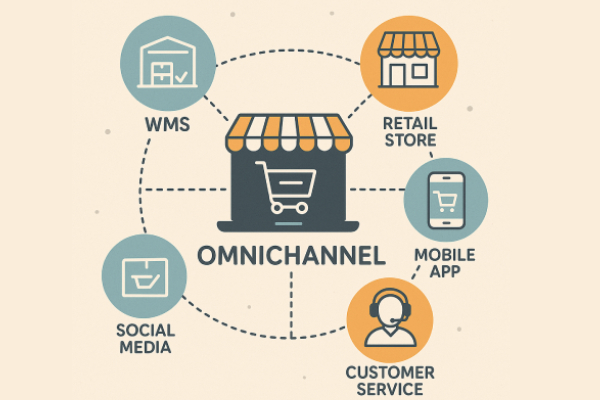Every channel must show the same stock and the same orders. An omnichannel WMS makes that possible. It links stores and websites with marketplaces and warehouses. Staff see one live dashboard with real inventory and order status. That lowers mistakes and speeds delivery.
A clear system helps staff work faster and customers get better service. Small teams can run more like bigger teams. It is safe to say that A solid omnichannel WMS platform grows with your business and keeps things running smoothly.
This article will provide you with a better idea of why your business should have an omnichannel WMS. You will also learn the best practices and strategies to make the most out of it.
What is an Omnichannel WMS?
An omnichannel WMS is software that manages inventory and orders across channels. It tracks stock in stores and in warehouses. In addition to that, it matches orders to the best place to ship from. It handles a wide range of things as well, such as:
in-store pickup, ship-from-store, and direct delivery. It also records returns and restocks items. Many teams use a dedicated e-commerce omnichannel fulfillment WMS to keep all these steps in sync and visible every day.
Key Features and Functions of an Omnichannel WMS
An omnichannel WMS must show stock across sites and route orders to handle returns. Teams use one dashboard to pick and pack as well as ship. Automation speeds choices and cuts errors. Visibility means fewer surprises and faster customer responses, and improves planning each day for teams. Here is what it should offer.
-
Real-time Inventory Visibility
The system updates stock the moment a sale happens. This stops overselling. It also flags low stock and triggers replenishment. A strong e-commerce omnichannel fulfillment WMS gives clear counts by location. Staff can trust the numbers and act fast.
-
Unified Order Management
All orders flow into one place. Web orders or in-store buys at different marketplaces appear in the same queue. The WMS shows priority and status. Staff assign picks and print labels from one screen. This cuts double work and speeds fulfillment.
-
Flexible Fulfillment
The WMS chooses the best source for each order. It may route a nearby store to ship. Or it may use a central warehouse. Rules set the cost and speed trade-offs. You can change rules as needs shift. Pick rules that match your cost goals.
-
Returns Management
Returns are tracked and processed in the same system. The WMS logs condition and restock actions. It also handles refunds to ensure secure and quick processing. This keeps inventory accurate and speeds resale where possible. A clear return path saves time and reduces losses.
-
Cross-Channel Coordination
APIs and integrations sync systems. Choose an omnichannel WMS platform that links POS, ecommerce, and carriers. This ensures orders move without manual handoffs. Strong integrations cut errors and keep customers informed.
Why Omnichannel WMS is Essential
An effective WMS reduces missed sales and speeds delivery, which can cut returns. It gives managers clear reports and staff clear tasks. Using a strong omnichannel WMS platform makes daily work steady. Teams predict demand and adjust stock fast to meet customer expectations every day.
-
Enhanced Customer Experience
Customers get accurate stock info and clear delivery times. They can pick up orders in store or get fast home delivery. Customers get quick updates and smooth returns when the system works. That builds trust and repeat business.
-
Increased Operational Efficiency
Staff follow clear tasks from the WMS. Picking routes is shorter. Packing steps are consistent. Automation reduces manual data entry. Teams finish more orders with less effort. Efficiency saves time and reduces mistakes.
-
Improved Profitability
Smart routing lowers shipping costs. Less overstock means less capital tied up. Faster delivery raises conversions. These gains improve margins together. Choosing the best WMS for omnichannel fulfillment helps protect profits while serving more customers.
-
Adaptability to Market Trends
A good WMS offers a wide range of benefits. It supports marketplaces, mobile apps, and local pickup. You can test new services with small pilots. The system keeps data aligned as you grow.
Final Words
An omnichannel WMS ties all sales channels into one clear view. It cuts errors and speeds orders to support growth. Choose the best WMS for omnichannel fulfillment that fits your needs. Start with core features and train staff well to expand step by step every month.
WizeFulfill will help you deploy an omnichannel WMS, reduce errors, speed delivery, and improve customer satisfaction across all sales channels.



